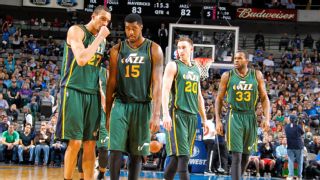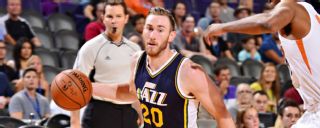|
Of all the characters he can play as on "NBA 2K," my son plays with Gordon Hayward as his dude. Not Kevin Durant. Not Stephen Curry. Not the guy he thinks will be MVP this year, Anthony Davis, or his favorite player, Blake Griffin. Not LeBron James. He balls with Hayward. All day, every day, all the time. When asked why, my son simply says: "His competitiveness. Dude competes like Jordan." He says give him Hayward and "four other random players," and he'll beat -- excuse me, "beats" anyone. Hayward "gets me wins." Hayward's response to his latest fan? "I like that," as if he knows people like my son; as if he's heard and seen it all before. As if everyone else's way of competing is in some way just an imitation of his life.
Scoop Jackson: Your NBA career is six years in. Do you still feel as if you are playing in the shadow of John Stockton and Karl Malone in Utah, or has it officially turned a corner? Gordon Hayward: You know, I think first and foremost, Stockton and Malone are legends here and will always be legends. I think in Utah we will always be a little bit in their shadow just because they are two of the greatest players of all time. But we are starting to form our own identity here, and I think we turned the corner last year. You know, [we have a new coach in Quin Snyder] and he's doing things his way and the city, I think, is beginning to get behind us as a younger team and we're ready to start our own and build our own identity, for sure. Scoop: Do you feel some responsibility in that? Hayward: No doubt. I definitely do. Like you said, it's my sixth year here and it's definitely our time. Our time to get things going and start to turn this ship around. Scoop: Has the early part of your career played itself out the way you envisioned it? Hayward: I didn't expect myself leaving early from college at all. And just, going to the national title game and then being drafted, everything just happened so fast. And then, you know, my first year, Coach [Jerry] Sloan resigns and then [Deron Williams], our all-star point guard got traded and it all just happened so fast. I really just got to experience what the NBA was like in just one year and find out how much of it is just a business. Scoop: But now that you have a foundation, do you feel it's made you a better player? Hayward: I do. I definitely think that I learned a lot of lessons in my first few years in Utah. Nothing was given to me or anything like that, so it was something where I learned a lot about the league and how it works. I was put in a lot of different situations. I came off the bench, started a little bit, I went back to the bench a little bit, I was the third option for a little bit, then I became a first option. Then learning how to be a "first option," you know that's a difficult thing to learn to do in this league, so it was good to have a couple of years where I kind of learned things like where you get your shots and how to get your shots and how to control the game, you know, all of those things definitely made me a better basketball player for sure. We're all still learning in Utah, we're still a very, very young team, so it was good to have that time and those experiences. Scoop: How big of an adjustment can it be to inherit that "No. 1 option" role for a franchise? Hayward: It's just a learning curve, honestly. I think it's one of those things where, you know, if you play one way probably the first three years in the league and then you are asked it do something different. It's just a role change, something you have to get adjusted to. You know, defenses are now keying on you and playing things differently to where you are at all of the time. That's a huge step and something, like I said, that I was able to kind of learn and do for two years. Scoop: Have you ever walked into an opponent's locker room before a game and seen your name at the top of the white board just to see their defensive strategies they have planned for you? Hayward: I have not [laughing]. I've never seen that. Or a scouting report on me or on our team. Scoop: You have to sneak and do that. It's one of those "No. 1 option" things. Hayward: I should definitely do that. Scoop: Do the media and other players underestimate you? Hayward: I don't think they do anymore. I think they probably did when I first came in the league -- 100 percent did. But this is my sixth year, and I think they definitely respect me as a player now. Scoop: I've heard you referred to you as "the Jazz's version of LeBron James" in that you do everything for the team. When you hear that, how does it make you feel? Hayward: It's definitely pretty humbling to think that someone would say that, but I think it's just something where I just try to be an all-around player and try to do a lot for the team. And yeah, I think LeBron's a guy that obviously does that for his team no matter which team he's on, and he's probably one of the best ever to do that. So, but for me, if I'm not scoring I need to be assisting or making plays for other people or rebounding or just doing whatever I can to get guys in position where they can be successful. Scoop: Do you think of yourself in that vein? In that, you "have to be LeBron" for this franchise? Hayward: I think so. I think that it is a lot of responsibility but something that they have trusted me with and I definitely have to be active and have to affect all parts of the game in order for us to be a successful team. I've never been a guy that's going to go out and just affect one part of the game. I think that I've always been somebody that tries to affect multiple parts of the game, and I think we have a lot of guys that can do a lot of different things, so it's not just me. We're a versatile team. I'm excited about where we can go. Scoop: Utah went 19-10 after the All-Star break while holding opponents to a league-low 94.8 points per 100 possessions. Was that just a good two months or was that indicative of what this team had become? Hayward: Yeah, I think that's definitely our identity and definitely what's going to have to be our identity moving forward if we want to be successful, especially in the West. Defense is something that can go with us wherever we are at. We are going to have times when people's shots are off and we're just not feeling it offensively, but if we continue to play defense like we did at the end of the year -- something that I think we are very capable of doing -- we can always stay in games and give ourselves a chance. Scoop: Is that a worry you have going into the season: Whether or not you can carry that mentality and execution day in, day out? Hayward: I think that's going to be a question we have as a team whether we can do that. I think we showed what we are capable over a short period of time, but that's the hardest part about the NBA. It's 82 games. It's a long season and things happen. Guys get hurt, you have to fight through adversity, guys get traded, whatever, things happen. I think we took a big step last year by turning that corner after the All-Star break and it's definitely going to be some work.  Scoop: Can head coach Quin Snyder be too honest at times? Hayward: You are asking me if Coach Quin can be too honest? No, I think honesty is good. I think we definitely needed some reality checks. Like I said, being a young team the hardest part of the season is the mental part. At least for me. It's a mental grind. Just making sure you are focused every single night, night in and night out. So he needs to be honest with us, just to make sure that we're not [buying into] the hype that guys like you and the rest of the media are giving us. Because at the end of the day, we haven't done anything yet. So, yeah, he needs to be honest with us. That's part of his job. Scoop: I've seen how competitive you are. Do you personally feel your inner competitiveness is a gift or a curse? Hayward: I think it's a gift. I look at it as a gift. But I'm more of a positive person, so I think it's something that allows me to continue to work harder, continue to get in the gym. Because, it's just that I hate losing. Now maybe a sleep doctor might say that it's a curse because sometimes it's hard for me to sleep, but to me it's a gift. I try to use it as fuel, I try to use it as motivation. Scoop: More important for you: be a great player or be a great leader? Hayward: I think for me it's a little bit of both. I think one of the things that makes a great player is the ability to lead his team to wins and make the other players around him better. For me, being a great player means being a great leader. And it's something we need in Utah. Like I said, we're a young team. This is only my sixth year, and I'm only 25 and we have a couple of guys that are in their sixth year, too, so our team is going to need me and some of the other guys to lead them. Because we are so young and inexperienced, I think, for me it's a little bit of both. And I'm ready for that. It's something we've been missing as a team and it's definitely time for me to step up. I'm ready to take on that role.
|


